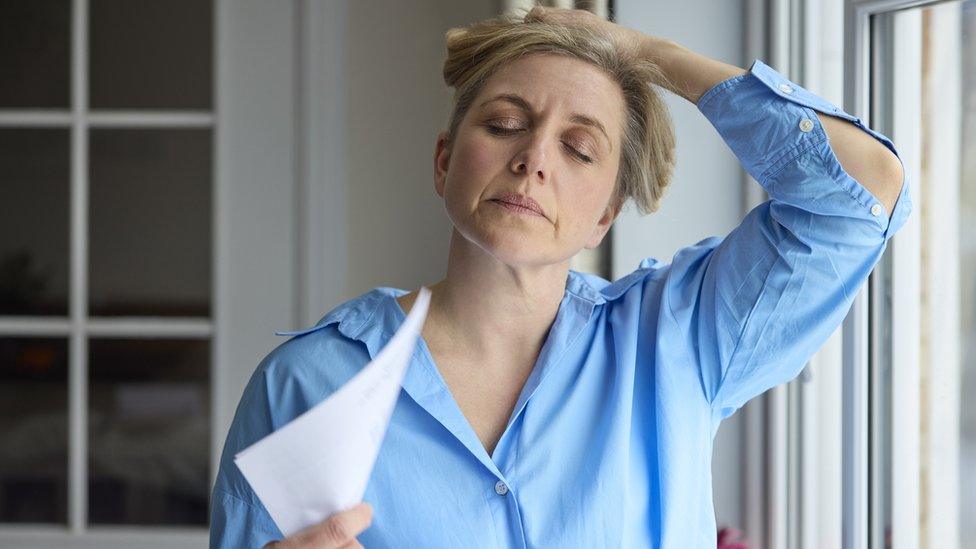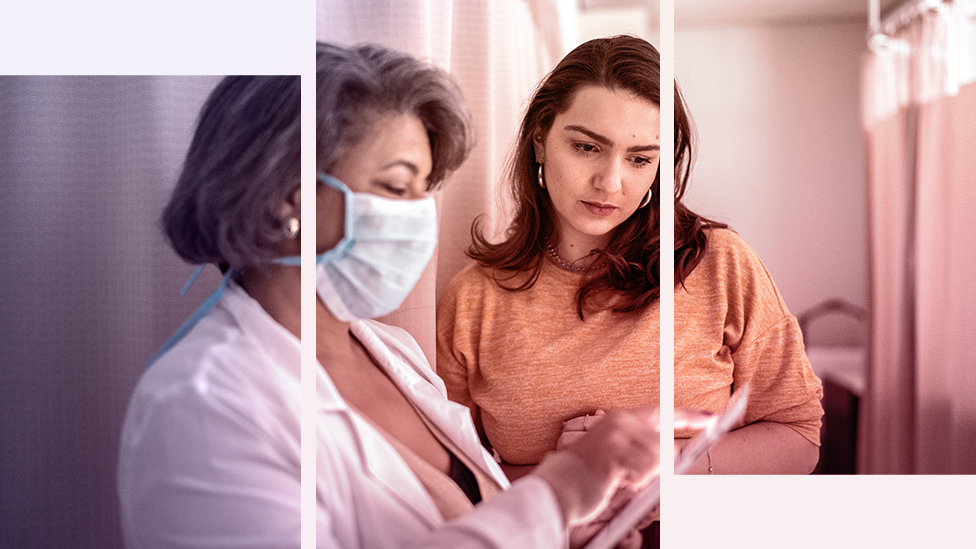CBT for menopause: NHS advised to offer talking therapy
- Published

Women should be offered talking therapy instead of, or as well as, hormone replacement therapy (HRT) for problematic menopause symptoms, new draft guidance, external for the NHS says.
The advice - the first update in almost a decade - says cognitive behaviour therapy (CBT) can help with hot flushes, and sleep and mood changes.
Health watchdog The National Institute for Health and Care Excellence (NICE) says this will give women more choice.
But critics called it "disappointing".
NICE says the evidence on HRT has become clearer since its last guidance on menopause in 2015. Its new one lists the pros and cons of different formulations that are available.
But it makes no new mention of testosterone therapy, which some menopausal women have been seeking from private clinics.
NICE says women should pick which treatments from its guidelines work best for them, weighing the risks and benefits with the help of their doctor.
And if they opt for HRT, use the lowest effective dose.
Some might want to use individual or group talking therapy sessions, either in person or online, the draft says.
According to some studies, coping skills taught by CBT can help sleep problems related to menopause, including how long it takes to nod off.
What is HRT and the menopause?
As women approach the menopause - when their periods permanently stop - their levels of the hormone oestrogen fluctuate and drop. It is these fluctuating hormone levels which can cause problematic symptoms.
HRT can be used to add back oestrogen and sometimes other hormones too, such as progesterone, and can ease symptoms some women experience as they go through menopause and help keep bones stronger.
There are lots of different formulations of HRT and ways of giving it, including oral tablets, skin patches and gels.
But, like any treatment, there can be side effects or increased risks.
What are the risks?
Ones to think about include:
The chance of getting breast, ovarian and womb cancer
The potential for blood clots, stroke and dementia
The risks may be very small and depend on individual factors, including age and existing health, as well as family history of these conditions.
For example, women who have had a hysterectomy, and so do not have a womb, will not need to take "protective" progesterone alongside oestrogen in their HRT because they cannot get womb cancer.
In terms of ovarian cancer, on average, for every 1,000 women taking oestrogen-only HRT for a decade there might be three extra cases, says NICE.
For 1,000 on combined oestrogen and progesterone HRT there might be one extra case.
Combined HRT does not increase the risk of stroke when the oestrogen component is taken as a skin patch or gel, but does slightly increase the risk if taken as a tablet, says NICE.
It might also marginally increase the risk of dementia if started over the age of 65, the guidance says.
What about testosterone?
Although it is a male hormone, women make testosterone in their bodies too and levels can decline with the menopause.
Some women say taking testosterone helps a number of menopausal symptoms, including brain fog. Currently, NICE says it can be considered for low sexual desire if HRT alone is not effective, but does not recommend it for anything else, saying the evidence is not yet there.
Prof Gillian Baird, who helped make the guidance, said: "This update includes important evidence based-information to help both women and healthcare practitioners during their discussions about the best treatment to manage their symptoms.
"This gives women more choice and enables them to make informed decisions for their personal circumstances."
The draft guidance is open to public consultation until 5 January 2024.
GP and menopause specialist Dr Louise Newson told journalists the document was "a disappointing draft update".
"CBT may have a place when taking a holistic approach to managing the perimenopause, but it won't improve every menopause symptom and won't treat the underlying hormone deficiency."
She said some of the potentially positive effects of HRT on conditions such as heart disease and clinical depression were missing from the document.
"Women deserve to have a choice, and those who want to take HRT should be able to have it prescribed, and frustratingly it is often more common for women to be prescribed antidepressants than HRT," she added.
The British Menopause Society said the addition of CBT was to be welcomed: "Greater emphasis on the importance and effectiveness of CBT is well-placed, along with clear balancing of benefits and risks of HRT."

Have you been affected by issues covered in this story? You can share your experiences by emailing haveyoursay@bbc.co.uk, external.
Please include a contact number if you are willing to speak to a BBC journalist. You can also get in touch in the following ways:
WhatsApp: +44 7756 165803
Tweet: @BBC_HaveYourSay, external
Please read our terms & conditions and privacy policy
If you are reading this page and can't see the form you will need to visit the mobile version of the BBC website to submit your question or comment or you can email us at HaveYourSay@bbc.co.uk, external. Please include your name, age and location with any submission.
Related topics
- Published7 November 2024

- Published7 November 2024
